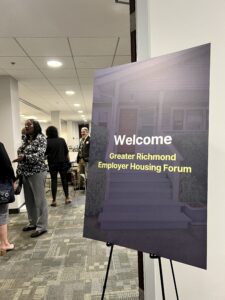Boosting Affordable Housing Through Employer Housing Assistance Programs
Leaders from the private sector and nonprofits met for the Greater Richmond Employer Housing Forum at Virginia Housing’s Learning Center in

Welcome signage at the Greater Richmond Employer Housing Forum at Virginia Housing’s Learning Center in Henrico County.
Henrico County in June to explore how organizations can help increase access to affordable housing in our community.
During the event, a variety of experts shared perspectives and strategies to support housing affordability in the region today and in the future. One of the topics: Employer Assisted Housing (EAH) programs, which can take various forms, was centered around organizations helping staff find quality and affordable housing.
EAH programs act as an employee benefit and can increase loyalty, satisfaction, retention and productivity, according to presenter Mike Scheurer, Executive Vice President of Housing and Community Development at Cornerstones Housing Corporation. An affordable housing expert with more than 25 years of experience, Scheurer led a discussion about financial and non-financial opportunities for employers to help employees obtain quality housing.
Here are some examples:
Down payment and closing cost assistance
A recent Bankrate survey reveals that most Americans (74%) view homeownership as a key pillar of the American dream. Yet affordability challenges remain. In another Bank of America survey, about 30% of homebuyers worry they cannot affordable closing costs. EAH grants help buyers overcome the downpayment hurdle by offering one-time grants directed at closing costs.
Fannie Mae, for example, offers a one-time $10,000 grant paid to employees after closing. The eligible property must be a single-family dwelling, townhome or condo in the primary residence.
In the Richmond region, Henrico County is working to help staff purchase their first homes through a new EAH program that will provide forgivable loans of up to $20,000.
The University of Pennsylvania and Howard University have also offered successful EAH programs over the years.
“Soft second” loans
“Soft second” loans from employers are no-interest second mortgages that can help homebuyers with down payments.
“It’s a second mortgage that helps you buy housing, but doesn’t amortize,” explained Scheurer.
While rules vary, these zero-interest loans are typically forgiven after a certain number of years. Borrowers who move or sell their home before an agreed upon period would usually need to pay back the loan.
Matching contributions
A matching contribution is exactly that – an employer matches the downpayment contribution from an employee.
For example, the District of Columbia offers matching grants from $5,000-$15,000.
Community trusts
In 2016, The Maggie Walker Community Land Trust (MWCLT) formed in Richmond to help low and moderate-income families by homes. MWCLT creates affordable homes that are sold to qualified buyers while retaining ownership of the land beneath the home. Families build wealth through monthly mortgage payments and agree to sell the home in the future at an affordable price determined by the region’s Area Median Income.
MWCLT relies on the Community Land Trust (CLT) model, a proven framework for providing affordable homeownership opportunities. The model is something employers can support too.
Grappling with low vacancy rates and high home prices, the Rochester Area Foundation in Rochester, MN raised an initial $13 million from local employers to create the First Homes Community Land Trust in 2004. The project was aimed at providing affordable housing and rental units for local employees. Hundreds of home purchases later, the community continues to provide affordable housing for families in the Rochester community.
Inclusionary zoning
Inclusionary zoning requires or provides incentives for builders to make a portion of units in new developments affordable based on the median income in the area. The policy often provides cost-saving opportunities for developers while helping to ensure a percentage of new units are affordable for low and moderate income families.
Inclusionary zoning policies can be found at the jurisdiction and state level across the U.S. Because the policies can help boost workforce housing, it can make sense for local companies to advocate for inclusionary zoning benefits in the surrounding communities where offices or warehouses are based to help boost housing options for employees.
Non-financial strategies
Companies can help an employee’s housing journey through non-financial means as well.
- Classes: Partner with a local nonprofit or housing organization and provide homebuying education opportunities to employees. The sessions can help staff understand market trends, mortgage rates and other necessary steps for purchasing a home.
- Time-off: Give employees extra days off with pay surrounding closing or moving can help ease stress while building company loyalty.
- Providing a trusted advisor: Help employees navigate the homebuying process by providing a go-to list of trusted advisors such a realtors or mortgage specialists that can answer complex questions.
Learn more: Employer-Assisted Housing Resource Guide
Interested in exploring more strategies for engaging in EAHs? The Greater Richmond Employer Housing Forum partner Virginia Housing created the Employer-Assisted Housing Resource Guide.
The helpful guide provides EAH program options, case studies and potential financing options. Access it for free today.
For more resources for the Greater Richmond Employer Housing Forum, visit Partnership for Affordable Housing’s website.

